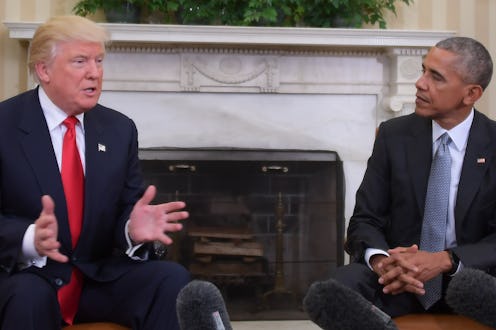News
The Voters Who Flipped From Obama To Trump
In the wake of Donald Trump's upset over Hillary Clinton, it sometimes feels like every American who did not vote for Trump has been wrestling with the question of why so many did. Some attribute his win to his racist, xenophobic, and/or sexist rhetoric; others point to his "outsider" status as his main appeal to those who felt the political establishment never met their interests. These are undoubtedly factors for some Trump supporters. But the fact that a number of people who voted for Barack Obama voted for Trump this time around highlights another important reason: His message sold among the white working class.
The Washington Post reported that one-third of counties that voted for Obama both in 2008 and 2012 went to Trump this year. And Trump won 194 of the 207 counties that voted Obama one of those years. By contrast, Clinton won only six of the 2,200 counties that didn't support Obama either year.
The majority of the Obama-turned-Trump counties were concentrated in the "industrial Midwest," also known as the Rust Belt — states like Michigan, Wisconsin, Minnesota, Iowa, and Indiana, where manufacturing jobs have moved away from the area, partly due to trade deals that sent such jobs over to lower-wage countries abroad. Obama was popular among these working-class voters (or at least more so than his Republican rivals), many of whom elected him twice (though we may now question his commitment to the working class based on his support of another huge trade deal, the Trans-Pacific Partnership, during his final year in office), and Trump, with his tough talk on trade, appealed directly to this demographic in 2016.
Obama was keen to the possibility that Trump's message would resound among this group of voters, and he attempted to use his clout to deter them from the Republican nominee. Obama said of Trump, while campaigning for Clinton in Cleveland: "Look, if a guy's spent 70 years on this earth showing no regard for working people — there's no record that he's supported minimum wage, or supported collective bargaining or invested in poor communities — and then suddenly he's going to be the champion of working people? Come on. Come on, man."
Obama's appeal to his former supporters didn't take, whether due to the strength of Trump's rhetoric or a loss of faith in Obama's commitment to them. Another detail we would be remiss to ignore is that the two-time Obama-supporting counties that flipped to Trump were 81 percent white. Those that Clinton won are 55 percent white. This fact arguably suggests, at least, that white voters are more willing to treat Trump's divisive racial rhetoric as something that can be overlooked in favor of his economic rhetoric.
But that class and economic conditions were factors in the Trump decision for many voters is something that we would do well to acknowledge. The Democratic Party in particular ought to focus on giving them better options going forward.
